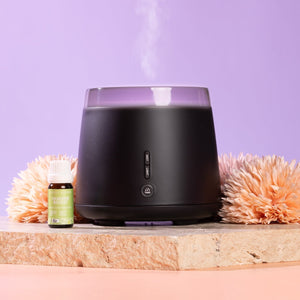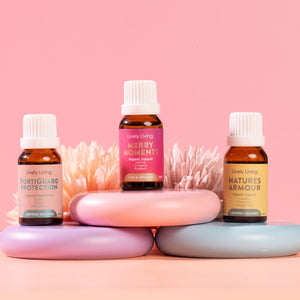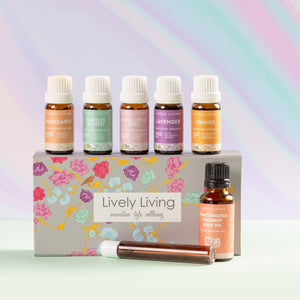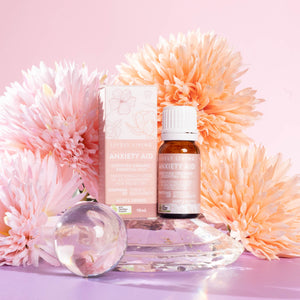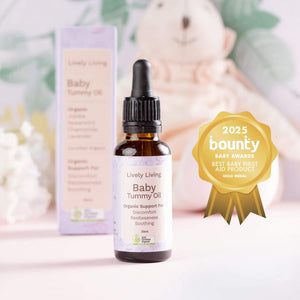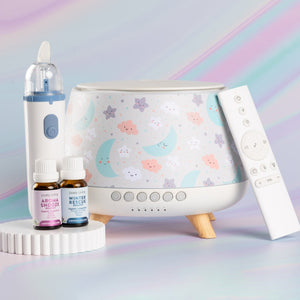Essential Oils for Sore Throat: Natural Relief Remedies
That raw, scratchy feeling in your throat can be quite unpleasant. It often makes swallowing feel like sandpaper, right? We've all experienced this, searching for relief, and maybe you're wondering about using essential oils for sore throat discomfort.
Essential oils come from plants, capturing their scent and potential benefits. People use them for many things, from improving mood to aiding sleep quality. So, could they work for that annoying throat pain, possibly linked to a respiratory tract infection?
Let's look at what some research and traditional use suggest about essential oils for sore throat support. This information aims to help you make informed choices about managing your symptoms, complementing other health approaches, not replacing medical advice especially during flu season.
Table of Contents:
- Understanding What's Behind Your Sore Throat
- How Might Essential Oils Help a Sore Throat?
- Popular Essential Oils for Sore Throat Symptoms
- Creating a Sore Throat Soothing Synergy
- How to Use Essential Oils Safely When Your Throat Hurts
- Important Cautions and When to Seek Medical Help
- Beyond the Sore Throat: Other Potential Uses
- FAQs about essential oils sore throat
- Conclusion
Understanding What's Behind Your Sore Throat
Before trying any remedy, it helps to know what might be causing your throat discomfort. Often, it's a sign your body is fighting off invaders. These could be viruses, like those causing the common cold or flu, leading to various respiratory symptoms.
Sometimes, bacteria are the culprits, such as in strep throat, a common tract infection. Allergies, dry air, irritants like smoke, or even straining your voice can also lead to soreness. Identifying the cause helps guide treatment, especially since bacterial infections often need antibiotics.
While essential oils won't cure an underlying infection, some people find they offer symptomatic relief. Consider them potential helpers alongside rest and hydration. Harvard Medical School offers several conventional sore throat soothing options to consider as well.

How Might Essential Oils Help a Sore Throat?
Essential oils are concentrated plant extracts. They contain compounds that plants use for their own protection. These compounds sometimes possess properties that could benefit human health.
Some oils are thought to have antimicrobial effects, possibly helping fight certain germs. Others may possess anti-inflammatory properties, which could potentially help reduce swelling and pain associated with a sore throat or other conditions health conditions. Ongoing research continues to explore these possibilities, with some studies offering interesting clues about taming inflammation.
Remember, these oils are very potent. They should be used carefully and are typically inhaled or diluted for skin application, never swallowed. Let's explore specific oils and safe usage methods.
Popular Essential Oils for Sore Throat Symptoms
Several essential oils are frequently mentioned when discussing natural throat relief. Scientific backing varies, but here's a look at some common choices and related findings.
Eucalyptus Oil
You might recognize the strong scent of eucalyptus from chest rubs or cold remedies. This is often due to a compound called eucalyptol (or 1,8-cineole). It's believed to have anti-inflammatory effects and might help open airways in the respiratory tract.
A 2021 review discussed its potential for reducing airway swelling. Another study from 2011 examined the antibacterial properties of different eucalyptus oils, finding variability but suggesting activity against some bacteria. Inhaling steam with eucalyptus oil is a common approach for easing throat discomfort and nasal symptoms.
Peppermint Oil
Peppermint essential oil contains menthol, providing that well-known cooling sensation. This cooling might temporarily numb throat pain or make breathing feel clearer. Many throat lozenges utilize peppermint essential menthol for this purpose.
While some feel it acts as a decongestant, strong evidence is limited. However, a 2015 study found its antibacterial action compared well to an antibiotic against certain bacteria. Inhaling peppermint essential oil may also help with inflammation and pain, but use it carefully, especially around children.
Tea Tree Oil
Tea tree oil is famous for its powerful antimicrobial properties. It’s often found in skin care products and sometimes in oral hygiene items. These properties could theoretically help combat germs contributing to a sore throat.
A 2013 study highlighted its strong antibacterial and anti-inflammatory effects. Tea tree oil is sometimes used as an antiseptic, like for gum problems. Using it via steam inhalation might be one way to address throat discomfort.
Lavender Oil
Often linked with relaxation and improved sleep quality, lavender might offer more benefits. A 2005 review mentioned its potential anti-inflammatory and antimicrobial qualities. While known for calming nerves, these properties could potentially help an irritated throat too, contributing to overall mental well-being.
More research is needed to confirm lavender's specific role in easing sore throats. Its calming scent, however, could be a welcome addition when you're feeling unwell. Combining it with other oils in a diffuser might enhance your environment, promoting relaxation important for women's wellness.
Thyme Oil
Thyme is more than just a cooking herb; certain types of thyme essential oil show impressive antibacterial action. A 2011 study found it effective against some antibiotic-resistant bacteria. This points to its potential strength against certain microbes.
Thyme oil might also help reduce muscle spasms. This could be helpful if coughing is making your sore throat worse. Due to its potency, careful dilution and cautious use are very important.
Lemon Oil
Lemon essential oil's bright scent is known to be uplifting. It might also possess germ-fighting potential. Research published in 2017 showed its strong antibacterial effects against bacteria causing listeria infections.
While this doesn't directly prove effectiveness for common sore throats, it suggests broad antibacterial capabilities for lemon essential oil. Remember that citrus oils like lemon essential oil can increase skin sensitivity to sunlight; avoid sun exposure on areas where diluted lemon oil has been applied. Diffusing it avoids this issue.
Ginger Oil
Ginger is often used for nausea, but its benefits might extend to colds and throat pain. It's known for containing anti-inflammatory compounds. According to Herbal Medicine: Biomolecular and Clinical Aspects, these properties could help soothe throat irritation and support taming inflammation efforts.
Inhaling ginger essential oil via steam or a diffuser might offer warmth and comfort. Its spicy aroma can feel invigorating when you're feeling under the weather. This natural approach is popular in many wellness topics.
Garlic Oil
Garlic is a traditional remedy superstar, partly due to a compound called allicin. Garlic oil contains allicin, which is recognized for its antiviral and antifungal properties. This makes it particularly interesting for sore throats caused by viruses.
A 2014 review discussed garlic's antibacterial actions against various bacteria. Although the aroma is quite strong, diffusing it (perhaps blended with other oils) could be an option if the scent doesn't bother you. Some wellness wellness topics explore traditional uses of garlic.
Oregano Oil
Similar to thyme, oregano oil is another potent essential oil derived from a culinary herb. It contains compounds like carvacrol and thymol, known for strong antimicrobial activity. Studies suggest oregano oil has broad-spectrum effects against bacteria and fungi.
Because of its strength, oregano oil must be heavily diluted before any topical use and should never be ingested unless guided by an expert. Its potential role in fighting germs makes it relevant to sore throat discussions, though it requires careful handling. Researching its specific applications can be part of exploring wellness wellness.
Essential Oil Blends
Sometimes, combining oils creates a beneficial interaction. A 2017 study looked at a blend containing cinnamon, wild carrot, eucalyptus, and rosemary. Researchers found this specific blend demonstrated both antibacterial and antiviral effects.
This highlights the potential of well-formulated blends. The study suggested such combinations might help against flu viruses and even secondary bacterial pneumonia risks. Trying pre-made blends or creating your own (with caution) is another possibility.
Family Size Winter Rescue Remedy
Creating a Sore Throat Soothing Synergy
Inspired by effective blends, you might try making your own simple mix for diffusion or steam inhalation. This recipe uses oils often mentioned for supporting the respiratory tract.
DIY Soothing Throat Blend (for diffusion/inhalation only):
- Start with a clean, empty 5ml or 10ml essential oil bottle.
- Add the following drops:
- 30 drops Eucalyptus essential oil
- 20 drops Peppermint essential oil
- 20 drops Tea Tree oil
- 10 drops Lemon essential oil
- Cap the bottle tightly and gently roll it between your hands to mix.
- Label clearly, including the date. Check resources like drugs a-z if you have concerns about interactions, though inhalation carries lower risk than ingestion.
Add a few drops of this blend to your diffuser or use it for steam inhalation as described below. Always follow recommended dilution and safety guidelines.
How to Use Essential Oils Safely When Your Throat Hurts
Using essential oils correctly and safely is very important. They are highly concentrated plant extracts and need careful handling. Here’s how to approach using essential oils sore throat discomfort safely.
Choose Quality Oils
The essential oil market lacks strict regulation. Look for reputable brands that provide key details like the plant's botanical name, origin, and extraction method. Some consumers prefer organic options, which can be found among quality essential oils reviewed on sites that may also offer product reviews.
Always Dilute for Skin Use
Never apply essential oils directly to your skin without dilution. Always mix them with a carrier oil first, such as coconut, jojoba, or sweet almond oil. A general safe dilution for adults is 3-5 drops of essential oil per teaspoon (5ml) of carrier oil.
Perform a Patch Test
Before using a new oil or blend on your skin, perform a patch test. Apply a tiny amount of the diluted oil to your inner forearm. Wait 24 hours to check for any redness, itching, or irritation, which could signal contact dermatitis, an aspect sometimes covered in skin care advice.
Safe Application Methods
Focus on inhalation or cautious topical application for sore throat symptoms:
- Steam Inhalation: Add 2-5 drops of essential oil (or your blend) to a bowl of steaming (not boiling) water. Drape a towel over your head, close your eyes, and inhale the steam for 5-10 minutes. Keep your face a safe distance from the hot water to avoid burns.
- Diffusion: Add the number of drops recommended by your diffuser's manufacturer (usually 5-10) to your device. This disperses the oil gently into the air for inhalation. Consider this as part of creating a healthier home environment, a popular topic in health news.
- Direct Inhalation: Place 1-2 drops on a tissue or cotton ball and inhale deeply. Keep this nearby, perhaps on your nightstand, for easy access.
- Diluted Topical Rub: Mix essential oils with a carrier oil as previously described. Gently massage a small amount onto the skin of your neck and upper chest area.
- Aromatic Bath: Combine 5-10 drops of essential oil with a carrier oil or an emulsifier like Epsom salts before adding to warm bathwater. This method combines skin exposure and inhalation, and information about using oils in the bath suggests it can be relaxing.

Always store essential oils properly, away from heat and light, and out of reach of children and pets. Check expiry dates as effectiveness can decrease over time.
Never Ingest Essential Oils
It must be stressed again: do not swallow essential oils unless under the direct supervision of a qualified healthcare professional specifically trained in aromatic medicine. Some oils, like eucalyptus, can be toxic if ingested, even in small amounts. The National Capital Poison Center warns ingestion can cause serious issues like seizures.
Important Cautions and When to Seek Medical Help
While exploring essential oils sore throat relief is one approach, being cautious is vital. These are potent substances, not guaranteed cures. Safety first, and knowing when professional medical advice is needed, is fundamental.
Not a Substitute for Medical Care
Essential oils can complement other self-care strategies but should not replace standard medical treatment, especially for severe or persistent symptoms. If your sore throat is severe, lasts over a week, or you suspect strep throat (a bacterial tract infection), consult a doctor. Some clinics now offer at-home testing options for conditions like strep.
Seek prompt medical attention, potentially needing information from resources like a pill identifier if prescribed medication, if you experience:
- Difficulty breathing or shortness of breath.
- Trouble swallowing your own saliva.
- High fever.
- Significantly swollen lymph nodes in the neck.
- A rash accompanying the sore throat.
- Symptoms that worsen or do not improve after several days.
- Coughing up blood or very thick phlegm (referencing NHS cough information may be useful).
Pregnancy and Breastfeeding
If you are pregnant or breastfeeding, use extreme caution with essential oils. The safety of many oils during these periods has not been established. Always consult your healthcare provider, who might cover this under women's health guidance, before using any essential oils.
Use with Children and Babies
Essential oils require extra careful consideration around infants and young children, whose systems are more sensitive. Some oils, like peppermint essential oil, can potentially cause breathing problems in very young children, as noted in a 2007 medical report.
Furthermore, oils such as lavender and tea tree oil are being studied as potential hormone disruptors in children. Consult a pediatrician or a certified aromatherapist knowledgeable about child safety before using oils on or near children. Keep all oils securely stored where children cannot reach them.
Consider looking for resources specifically about child wellness, maybe even finding a season survival guide tailored for families. Information from reliable sources like those associated with Debra Rose Wilson or Rose Wilson, often found on platforms like Healthline Media (an RVO Health company), might offer insights, but always prioritize your pediatrician's advice. Note: RVO Health holds rights reserved on their content.
Potential Side Effects and Interactions
Even with proper use, some individuals may experience side effects like skin irritation or allergic reactions. Stop using the oil immediately if you notice any adverse effects. Be aware of potential interactions with medications or existing health conditions (like high cholesterol, diabetes nutrition needs, ulcerative colitis essentials, or psoriatic arthritis); discuss essential oil use with your doctor if you have underlying health concerns or take medications.
Beyond the Sore Throat: Other Potential Uses
Aromatherapy covers a wide range of applications beyond just sore throat symptoms. If you find essential oils beneficial, you might explore their use for other common concerns covered in various wellness topics. Many people use specific oils like lavender or chamomile to promote restful sleep quality when dealing with illness or stress, supporting mental health.
Blends are also formulated for different purposes, such as invigorating mixes for energy or calming blends for relaxation. You can find guides exploring oils for headaches, muscle aches, or finding comfort during menstrual cycles with period cramp oils, a topic relevant to women's health. Some resources like the Wellness Wire or a nutrition edition newsletter might offer tips, or even suggest healthy snacks or a walking workout as part of overall well-being.
Remember always to research specific uses, consult medically reviewed articles, check featured health news, and adhere to safety guidelines. Exploring lifestyle quizzes or featured programs focused on well-being can also be part of a broader approach to health, including areas like sexual health or men's health. This could be part of your personal flu season survival guide.
FAQs about essential oils sore throat
What is the best essential oil for a sore throat?
There isn't one single 'best' oil, as reactions vary and research continues. However, eucalyptus, peppermint essential oil, tea tree oil, and thyme are often highlighted. This is due to potential anti-inflammatory and antimicrobial properties suggested in some studies and traditional use.
How do you soothe a sore throat asap?
For fast relief, try traditional methods like warm liquids (tea with honey), salt water gargles, throat lozenges, and rest. Inhaling steam with a few drops of eucalyptus or peppermint essential oil might offer quick, though temporary, soothing for some. Severe or lasting pain needs a medical check.
How to use eucalyptus oil for a sore throat?
The safest methods involve inhalation. Add 3-5 drops to a bowl of hot (not boiling) water for steam inhalation (keep eyes closed.). Alternatively, put a similar amount in an essential oil diffuser to scent the room and inhale gently.
What essential oils prevent strep throat?
No essential oil can prevent strep throat, which is a bacterial infection needing antibiotics. While some oils like thyme and tea tree oil show antibacterial action in lab settings, this doesn't mean they prevent or cure strep in people. Depend on medical diagnosis and treatment for strep throat.
Conclusion
Looking into essential oils sore throat relief can be part of managing discomfort naturally. Oils like eucalyptus, peppermint essential oil, and tea tree oil show promise in early research for soothing symptoms. However, they aren't cures and shouldn't replace medical care when it's necessary.
Using essential oils safely is crucial – always dilute for skin use, do patch tests, never ingest them, and be extra careful with children, pets, and during pregnancy. Much evidence is still preliminary, often discussed in various wellness topics or featured health segments. Remember to listen to your body and consult healthcare professionals.
This allows you to manage your sore throat effectively and safely. Incorporating essential oils sore throat strategies wisely, if you choose, should complement conventional care and advice from sources perhaps reviewed by professionals like Debra Rose Wilson or associated with organizations like RVO Health Company.















